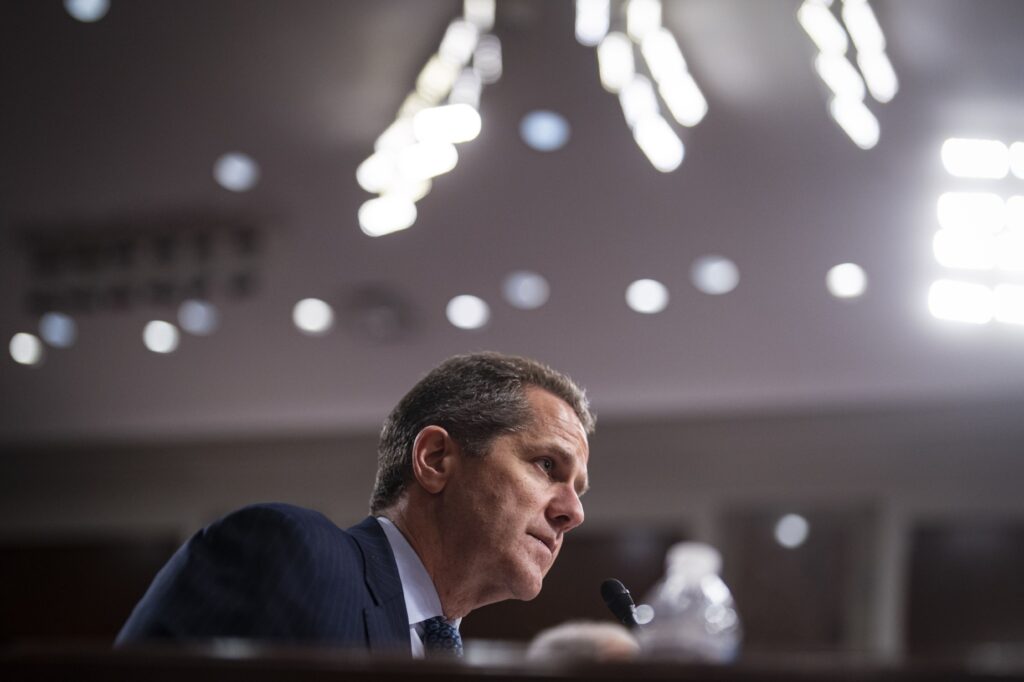
Michael Barr, vice chair for supervision at the US Federal Reserve, during a Senate Banking, Housing, and Urban Affairs Committee hearing in Washington, DC, US, on Thursday, May 18, 2023. Two senators on the committee say they have found flaws in regulators' oversight reviews before some of the recent bank failures, and are asking the president to appoint an independent investigator. Photographer: Al Drago/Bloomberg
Federal Reserve Governor Michael Barr has raised significant concerns regarding the regulatory framework established by the GENIUS Act, particularly emphasizing the need for stronger guardrails and consumer protections for stablecoins. Speaking at DC Fintech Week on October 12, 2023, Barr highlighted the inherent “gaps” in the act that must be addressed to ensure the stability and security of digital assets.
Barr pointed out that while the GENIUS Act, signed into law by President Donald Trump in July 2023, provides a foundational statutory framework, the onus is now on both federal and state regulators to develop comprehensive rules. He stressed that these regulations are essential to create robust protections for users and mitigate potential risks to the broader financial system.
Identifying Vulnerabilities in the GENIUS Act
During his address, Barr underscored the importance of implementing tighter controls over reserve assets, capital, and liquidity requirements. He expressed concern about potential vulnerabilities, especially regarding the types of permitted reserves that can back stablecoins. One notable issue is the use of uninsured deposits and foreign government-authorized mediums of exchange, including cryptocurrencies.
Barr explained that the volatility of cryptocurrencies could jeopardize the one-to-one backing that is fundamental to stablecoin liability. He stated, “Regulators have a lot of work to do to implement the act,” highlighting the necessity of establishing clear guidelines to ensure that stablecoins can operate securely within the financial landscape.
Furthermore, Barr criticized the provisions allowing stablecoin issuers associated with banks to engage in a wide range of activities without adhering to standard capital requirements. He warned that this could pose systemic risks not only to the banks involved but also to the entire financial ecosystem. “Appropriate capital requirements are another area where coordination among federal and state regulators is key,” he noted.
The Path Forward for Stablecoin Regulation
According to Barr, clarity is also lacking in consumer protections within the GENIUS Act. He pointed out that the act does not clearly define what constitutes a stablecoin, which undermines the establishment of fraud protections typically expected of traditional payment instruments.
“Stablecoins have the potential to improve the efficiency of the payment system, particularly in cross-border applications,” Barr stated. He emphasized that additional efforts are necessary to create the necessary guardrails that will protect households, businesses, and the financial system as a whole.
Many provisions of the GENIUS Act will be phased in over the next three years, during which federal and state regulators will need to establish rules governing the participation of banks and nonbank issuers in the stablecoin market. The Federal Reserve will play a crucial role in this process, as the stablecoin bill maintains the current status for nonbank payment stablecoins regarding access to master accounts.
As the regulatory landscape for stablecoins evolves, it is clear that effective oversight and comprehensive regulations will be essential in safeguarding both consumers and the financial system at large. Barr’s insights underline the critical importance of coordinated efforts among regulators to fill the existing gaps and ensure a secure future for stablecoins.






